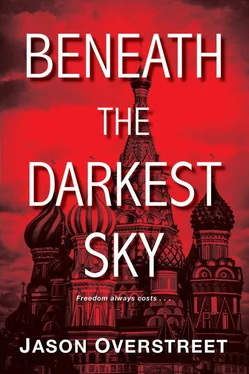“What is it?” I said.
“Tell him, James,” said Ginger, watching her brother dig through the picnic basket for a bottle of soda.
James popped the cap off, took a sip, and then asked me, “Why do men like to colonize countries where all of the people have black skin?”
I turned to his mother and we both froze. Neither of us could answer this seemingly simple question. I wondered what he’d read that had prompted such a question. I wanted to say something profound and philosophical on him, but no words came to mind. Maybe he was simply becoming more acutely aware of his own skin color. Whatever the case, his question had no obvious answer, so I turned to him and said, “That is a very good question, son. I’ll have to think about it.”
* * *
The next day, Sunday, I spent the morning at the house with the children while their mother was preparing her classroom at the Moscow Painting Academy. She would be back to teaching Monday morning, and she was anxious to share stories with her students about the successful Leningrad exhibit. I, on the other hand, was looking forward to the day when she would maybe be sharing stories with her students at the École Nationale Supérieure des Beaux-Arts in Paris.
At around noon, I took the children to the Torgsin grocery, where they sold a great variety of foods to Americans, one of the benefits of not being a Soviet citizen. I bought a big piece of beef to make a pot roast. I also bought some carrots, potatoes, and onions to cook with it.
Later that night at around six o’clock, I sat at the dining room table with James and Ginger waiting for Loretta to come home for dinner. She had been due home by five-thirty. Six o’clock turned to seven, and then eight. No sight of her and no telephone call either.
I’d asked the children to go ahead and eat their pot roast and vegetables, but they couldn’t muster up an appetite, consumed with worry over their absent mother. In the twenty-plus years we’d been together, she’d never been late for a planned dinner. I knew something was wrong.
When the clock struck nine, the children now doing homework, I sent them to bed. Shortly thereafter was a hard knock on the door and I rushed to answer. Two large blue tops stood there stone-faced. Both mustached, one five-eleven and stocky, the other six-three and broad shouldered.
“Is your name Prescott Sweet, and is this your residence?” the stocky one asked in Russian.
“Yes, Prescott Sweet. That is me. What is the problem, officers?”
They looked at each other, obviously a bit surprised that I’d responded in the Russian tongue, something they hadn’t expected from a colored American.
“Come with us,” the tall one said, reaching out and grabbing my arm.
I flung it free and stepped back into the living room. “Tell me what this is about?” I said. “Where is my wife? Loretta Sweet! What have you done to her?”
“She has been jailed for being a counterrevolutionary ,” he said. “Now… come with us.”
MR4 Labor Camp - Kirovsk, Russia
November 1938
THE MR4 LABOR CAMP WAS FAR CLOSER TO FINLAND THAN THE Soviet city of Leningrad. James and I had arrived in late November, having taken the ship south from Magadan to Vladivostok, and then the weeks’ long train ride across the country to Moscow. From there we’d taken a different train north to Leningrad. Once there, NKVD put us in the back of a cargo truck, where we had to endure more travel—a fifteen-hour drive north to Kirovsk.
There had been one big difference in our travel arrangements this time, however. We’d been kept in a decent cabin aboard the ship, and our train rides had been normal, the two of us given our own compartment aboard a car that was carrying free hires going home from the various camps.
The guards aboard both the ship and trains had been ordered to feed us three good meals a day. In fact, we had been accompanied by one particular blue top during the entire journey. He had checked in on us periodically from his adjacent ship cabin and train compartment. It was clear he had one job to do: make sure the American spy reaches his destination in one piece.
Four days after I’d met with Director Pavlov back at Magadan, Bobby had responded with a cable that confirmed what I’d predicted. His message had been short and specific. He had mentioned how sad he was to have heard about my pending divorce, but had gone on to say, “I can’t tell you how excited I am to see you on the first of January in Berlin. I will have a new visa and all of your embassy credentials waiting for you at Vitebsky Railway Station in Leningrad. You will be departing at 8:00 a.m. on December 29th. We have much to discuss.”
Ever since the Kremlin had learned of my spy proposal, James and I had found life much more livable. Both of us had gained about ten pounds over the last month and a half, but I was still concerned about James’s health. He was no longer having dizzy spells or coughing, but every few days he’d have these fits with breathing. He needed to see a proper doctor.
Our first day at the MR4 Labor Camp was spent in a small, vacant room inside a commander’s barracks. Our accompanying blue top had turned us over to a young guard named Osip. He couldn’t have been any older than twenty, not a hair on his pale face, but the rifle he was shouldering made him look just dangerous enough. And as he sat in the chair by the door, James and I moved about, sorting through the bags full of clothes and toiletries they’d given us. There was one bunk in the room and we had our items placed on the bottom bed.
“I can’t wait to trim this thick, ugly beard with these shears and then use this blade and cream,” I said to James in Russian, out of respect for Osip. “You haven’t seen your daddy clean-shaven in over a year, son.”
“There is a small mirror and sink in the toilet closet over there,” said Osip, whose soft Russian words sounded like those of a twelve-year-old. “But as soon as you are finished shaving, leave the scissors and blade on the sink for me to take. You can have it again whenever you need it.”
“Thank you,” I said, running my fingers through my beard.
“Also,” said Osip, “there are many guards stationed just outside this barracks. Don’t get any ideas.”
I nodded and continued sorting through my bag, nothing but thoughts of Loretta and Ginger on my mind. MR4 wasn’t actually in the town of Kirovsk, but rather about half a mile away. And, of course, the men’s camp was separate from the women’s. Snow-covered mountains surrounded the entire area; the town itself was situated on the shores of a stunning lake. We’d been able to see the town when the cargo truck refueled before dropping us off.
“Excuse me,” I said, turning again to Osip. “Would you happen to know when we will be able to see my wife and daughter?”
“I am going to take you to see Colonel Zorin in one hour. He can answer all of your questions. There is a tub room down the hall. After you shave, go bathe. Your boy can wait here while you meet with Colonel Zorin. And make sure you eat a second helping at every meal. Zorin’s orders! You only have one month before you leave for Berlin, and you must look normal. Right now you still look very much like a skinny, sick zek . Your comrade cannot be allowed to see you like this.”
Later that day, Osip accompanied me across the camp toward the north section, my new blue wadding coat keeping me plenty warm in this welcomed twenty-five degree weather. MR4 was considerably better kept than Magadan but had fewer barracks. Osip had told us about the open-pit mines in the surrounding area, and about the grueling schedule the zeks were forced to work mining for apatite. The moderate climate allowed for plenty of snow, but a zek freezing to death was highly unlikely.
Читать дальше











